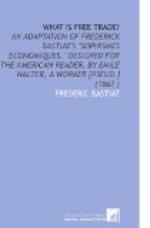Suppose that in the United States ten millions of hats are sold at five dollars each: this affords to the hatters’ trade an income of fifty millions. A machine is invented which allows hats to be afforded at three dollars each. The receipts are reduced to thirty millions, admitting that the consumption does not increase. But, for all that, the other twenty millions are not subtracted from human labor. Economized by the purchasers of hats, they will serve them in satisfying other needs, and by consequence will, to that amount, remunerate collective industry. With these two dollars saved, John will purchase a pair of shoes, James a book, William a piece of furniture, etc. Human labor, in the general, will thus continue to be encouraged to the amount of fifty millions; but this sum, beside giving the same number of hats as before, will add the gratifications obtained by the twenty millions which the machine has spared. These gratifications are the net products which America has gained by the invention. It is a gratuitous gift, a tax, which the genius of man has imposed on Nature. We do not deny that, in the course of the change, a certain amount of labor may have been displaced; but we cannot agree that it has been destroyed, or even diminished. The same holds true of importations.
We will resume the hypothesis. America makes ten millions of hats, of which the price was five dollars each. The foreigner invaded our market in furnishing us with hats at three dollars. We say that national labor will be not at all diminished. For it will have to produce to the amount of thirty millions, in order to pay for ten millions of hats at three dollars. And then there will remain to each purchaser two dollars saved on each hat, or a total of twenty millions, which will compensate for other enjoyments; that is to say, for other work. So the total of labor remains what it was; and the supplementary enjoyments, represented by twenty millions economized on the hats, will form the net profit of the importations, or of free trade.
No one need attempt to horrify us by a picture of the sufferings, which, in this hypothesis, will accompany the displacement of labor. For if prohibition had never existed, labor would have classed itself in accordance with the law of exchange, and no displacement would have taken place. If, on the contrary, prohibition has brought in an artificial and unproductive kind of work, it is prohibition, and not free trade, which is responsible for the inevitable displacement, in the transition from wrong to right.
Unless, indeed, it should be contended that, because an abuse cannot be destroyed without hurting those who profit by it, its existence for a single moment is reason enough why it should endure forever.
CHAPTER XXI.
RAW MATERIAL.
It is said that the most advantageous commerce consists in the exchange of manufactured goods for raw material, because this raw material is a spur to national labor.




